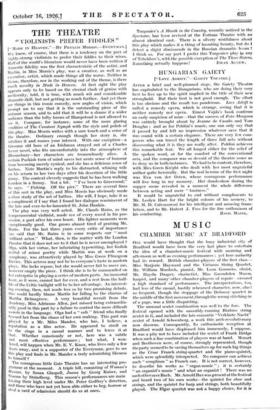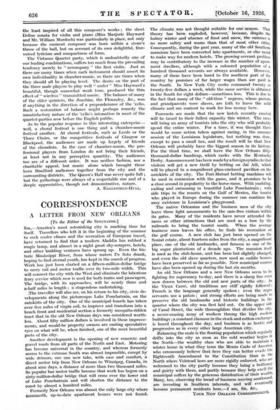ATUSIC
CHAMBER MUSIC AT BRADFORD
ONE would have thought that the busy industrial city of Bradford would have been the very last place to entertain
the idea of a chamber-music festival with morning and afternoon as well as evening performances ; yet here audacity had its reward. British chamber-players of the first class— Miss Marjorie Hayward and the Virtuoso String Quartet, Mr. William Murdoch, pianist, Mr. Leon Goossens, oboist, Mr. Haydn Draper, clarinetist, Miss Gwendolen Mason, harpist, and many'other chamber-players of repute—ensured a high standard of performance. The interpretations, too, had less of the casual, hastily rehearsed character, now, alas ! so frequent, though the stoppage of the Debussy quartet in the middle of the first movement,through the wrong stitching-in of a page, was a little disquieting.
The unusual sextet combination was well to the fore. The festival opened with the smoothly-running Brahms string sextet in G, and included the late-romantic "Verklarte Nacht" sextet of Arnold Schoenberg, a work this arch-revolutionary now disowns. Consequently, kis enthusiastic reception at Bradford would have displeased him immensely, I suppose. It was a pity not to have included the sextet of Frank Bridge when such a fine combination of players was at hand. Mozart and Beethoven were, of course, strongly represented, though the party seemed to be saving themselves up for such big things as the Cesar Franck string-quartet and the piano-quintet, which were splendidly interpreted. No composer can achieve such " semphism " as Franck can. It is not correct, however, to describe his works as " organ-music " ; it is certainly " an organist's music " and what an organist ! There was no such other save Bach. Mr. Arnold Bax was present at the festival and heard two -of his own worki—the quintet for oboe and . strings, and the quintet for harp and strings, both beautifully played.. -The Elgar quartet was not a happy choice, for it is
the least inspired of all this composer's works ; the short Delius sonata for violin and piano (Miss Marjorie Hayward and Mr. William Murdoch) was particularly in place, not only because the eminent composer was born within a stone's throw of the hall, but on account of its own delightful, free- voiced lyricism and compactness of form.
The Virtuoso Quartet party, which is undoubtedly one of our leading combinations, suffers too much from the prevailing tendency merely to " accompany " the first violin. Just as there are many times when each instrument should assert its own individuality in chamber-music, so there are times when they should all be playing level. The desire on the part of the three male players to play well " under " Miss Hayward's beautiful, though somewhat weak tone, produced the thin effect of " wireless " transmitted music. The balance of many of the older quintets, the Joachim, the Flonzaley, &c., was if anything in the direction of a preponderance of the 'cello. Such a restoration of balance might perhaps remedy the unsatisfactory nature of the 'cello's intonation in most of the quartet-parties now before the English public.
As to the popular response to this interesting enterprise— well, a choral festival is one thing and a chamber-music festival another. At choral festivals, such as Leeds or the Three Choirs, or the competitive festivals of Glasgow or Blackpool, the audiences are made up largely of friends of the choralists. In the case of chamber-music, the pro- fessional players from London do not bring their friends, at least not in any perceptive quantity. The audiences too are of a different order. It was neither fashion, nor a charitable appeal, but music alone which brought these keen Bradford audiences together from the city and the surrounding districts. The Queen's Hall was never quite full ; but the gatherings were always of a respectable size and of a deeply appreciative, though not demonstrative, nature.
A. EAGLEFIELD-HULL.























































 Previous page
Previous page